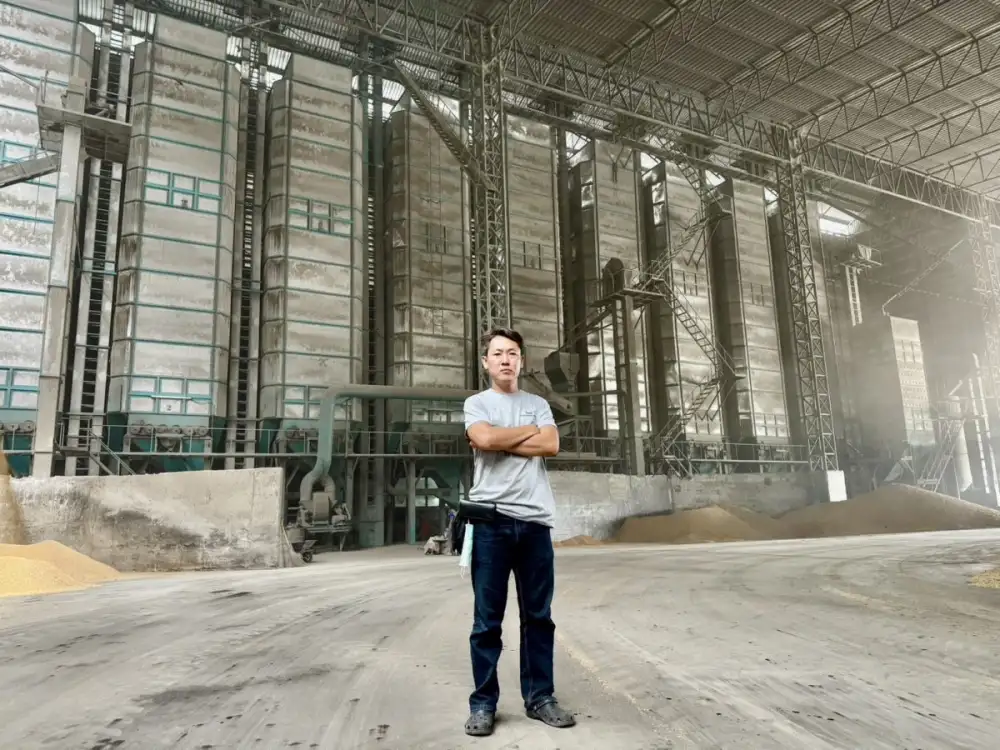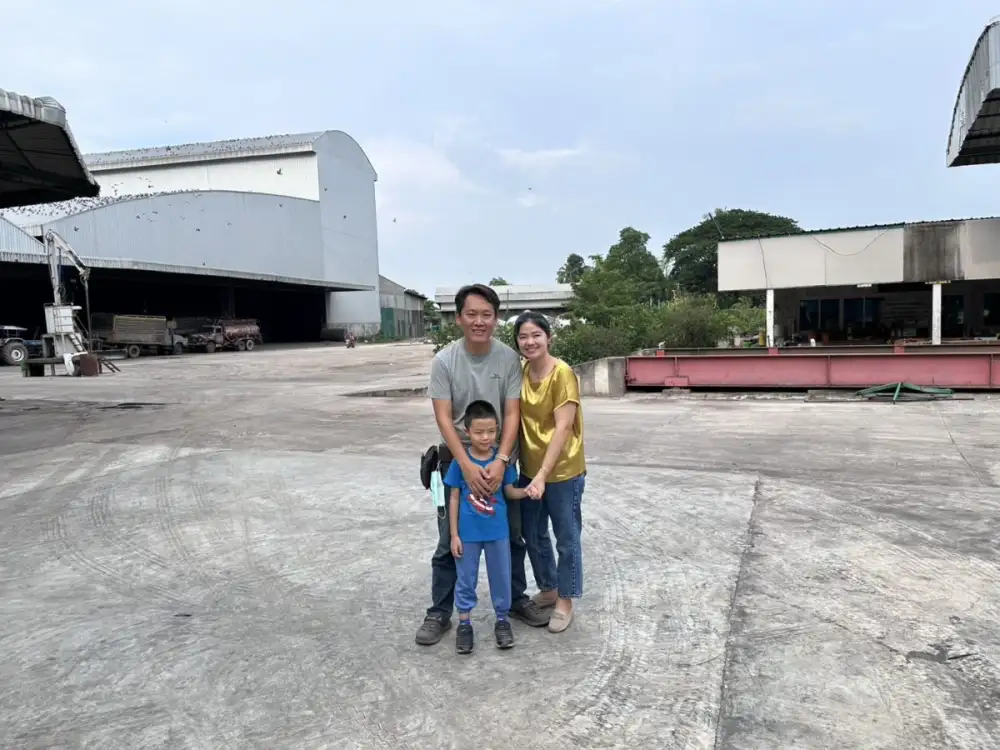
The rhythmic hum of machines never ceases just like Watthana Wanichakorn, who stands firm in an industry that many deem "unexciting" and "increasingly difficult to sustain." But to the youngest son of this prominent family, Thaiwattana Rungruang Tanyakij Rice Mill is more than just a business. It's a bond. A memory. The heart of his family.
The Wanichakorn family is a well-known name in Prachantakham district, Prachinburi province. Originally of the Jie clan from Shantou, China, the family's patriarch migrated to Thailand and laid down roots in the area. Their journey to prosperity began with a small grocery store over 80 years ago, gradually expanding into multiple enterprises.

Mr. Lek Wanichakorn was the second-generation heir. Together with his wife, Rachanee, they had five sons: Wason, Werachai, Worapot, Wirat, and Wattana. Each son grew up involved in the family's "kongsi" (Chinese-style communal enterprise), which spanned grocery stores, a rice mill, a gas station, a photo studio, a motorcycle shop, and a mini-marteach often named after a son.
- Wason, the eldest, became a renowned photographer and runs Viewpoint photo studio. He also oversees the family's 600-tree durian orchard.
- Werachai, the second son, pursued law, became a judge, and once ran a motorcycle shop.
- Worapot, the third, manages Wormart with their mother and operates Corner Cafe at the local Caltex gas station.
- Wirat, the fourth, settled in the U.S. with his family, where he owns a restaurant and school.
- Wattana, the youngest, inherited the responsibility of continuing Thaiwattana Rungruang Tanyakij Rice Mill.
Watthana grew up knowing that one day, he'd return to this business. The rice mill bears his name Thaiwattana given by his father when it was founded in 1984. That, he says, created a profound emotional connection and sense of responsibility.
Unlike his older brothers, who left their hometown after grade 9 to pursue higher education in Bangkok and abroad, Wattana's path was a bit different. He completed grades 7-12 at Surasakmontree School and later enrolled in the Communication Arts program at Bangkok University following in Wason's footsteps. "If I had to return and run the rice mill," he said, "I wanted to enjoy my university years first."
After earning his bachelor's degree, Wattana spent a year studying English in the United States just like most of his brothers, except Wason who focused on photography. But Wattana knew his time overseas was temporary. The rice mill awaited him. He returned in 2004, and shortly after, pursued an MBA at Burapha University to prepare for managing the family business.
At 46 today, Wattana recalls the early years vividly. He and his brothers helped with rice mill operations as kids back when everything was manual and labor-intensive. They saw firsthand how the business evolved with machinery and technology, and weathered fierce market competition and global economic shifts. In the last two decades alone, more than half the rice mills in the region have shut down.
"This mill wasn't originally ours," he explains. "We started by supplying rice to it. Around 1984, the original owners faced financial trouble, and my father took over. Back then, we had to dry rice in open fields, racing to collect it if rain came. My siblings and I were among the dozens of laborers working side by side."
Today, the mill uses drying machines, drastically reducing labor. But challenges remain.
The global rice market, shifting consumer habits, and rising competition from countries like India and Vietnam have squeezed Thai rice mill margins to just 1-2%. Many mills have shut downbut Watthana persists.
"We have to understand where every single baht goes. Electricity alone costs 700,000-800,000 baht a month, so we now run operations at night to cut costs."
He's not opposed to installing solar panels when costs drop, and continues to explore new opportunities.
Thaiwattana Mill specializes in parboiled rice for export to the Middle East and Africa. This rice, pre-cooked before milling, keeps longer. There's an oft-repeated tale: in desert countries, people wrap the rice in a wet scarf and bury it in the sand later, it's ready to eat.
Though jasmine rice remains Thailand's premium export, it's too costly for parboiled rice operations. Watthana once tried using jasmine rice, but the product didn't meet the hardness standard preferred by foreign markets, so the idea was abandoned.
Watthna married Ruthairat Pipatwanicha or "Nui," a former finance officer at Burapha University whom he met during MBA studies. They have a 7-year-old son, Norrawat Wanichakorn or "Thunder" who has grown up alongside the hum of the rice mill.
When asked if he wants his son to continue the business, Watthana answers, "Honestly, I don't want him to. It's a hard life. But if he chooses to, I won't stop him. My mother never forced us. She raised us to be good people, not to follow a path."
Their 81-year-old father still comes to the mill daily. "Dad is my inspiration," Wattana says. "He gave us life, stability, and opportunity. Everything I can still do, I willbecause of him."
Despite public perception, rice mills don't set prices they follow global markets. Two years ago, rice prices soared to 14,000 baht per ton due to India's export ban. This year, prices dropped to 7,000 baht. "We follow the market," Wattana explains. "If farmers bring rice from far away, we raise our purchase price, but profits drop."
The rice mill isn't just a business it's a living monument to the past. Founded by immigrants, sustained by generations, and now helmed by someone who grew up with its pulse. "I've never worked in a company or held a government job," Wattana says. "This is all I know. Dad worked so hard for us it's my turn now."
Their father was more than a rice trader he was a planter at heart. He once grew coconuts and santol fruit to sell at the gas station. During the rubber boom, he cultivated 30-40 rai of rubber trees. But his dream durian always eluded him.
A few years ago, he planted durians near the mill. Wason took over the orchard, applying academic farming techniques and expanding it to 600 trees within a year. They're now eyeing another plot 7 km away, with a former soil quarry that became a natural pond.
"Durian blooms filled the orchard, but not a single fruit set," Wattana recalls. "Like the rice mill sometimes we buy rice at high prices and end up selling low. It's unpredictable."
A New Market: Rice for Diabetics
One hopeful path is the diabetic market. Parboiled rice has a low glycemic index, suitable for people with diabetes. Watthana is exploring ways to process and flavor the rice for premium markets.
"Back in my MBA days, I researched thislow GI rice could fetch up to 350 baht per kilo. But taste matters. If it's healthy but not tasty, no one will buy it."
Still, he sees promise in health-conscious markets: organic rice, germinated brown rice, and low-GI optionsproducts requiring knowledge, quality, and care.
The business may no longer boom, and profits may dwindle, but what remains unchanged is the heart of a man who chooses to fight because for him, this is more than rice. This is legacy.